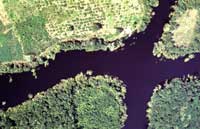“The erosion of biodiversity is as big a global challenge as climate change,” cautions Irina Bokova
Paris, 25 January

- © UNESCO/Luis Alberto
- Tropical forest and river, Amazonia, Brazil
The Director-General of UNESCO, Irina Bokova, opened the “Biodiversity Science Policy Conference” on Monday by underlining that preserving biological diversity represents “as big a global challenge as climate change”. She said the International Year of Biodiversity 2010 was an opportunity to reinforce UNESCO’s efforts to address “all aspects of biodiversity management and safeguarding”.
Regarding the project to create an intergovernmental platform on biodiversity and ecosystems services to promote exchange between scientists and policy-makers, similar to the Intergovernmental Panel on Climate Change (IPCC), Ms Bokova said UNESCO would want to cosponsor the initiative when it took form. Also present on the podium, Jean-Louis Borloo, French Minister for Ecology, Energy, Sustainable Development and Sea, expressed hope that the platform would be established “before the end of the year”.
Other participants at the opening of the conference were Carlos Gomes, Prime Minister of Guinea-Bissau; Henri Djombo, Minister of Sustainable Development, Forestry Economy and Environment of Congo; Ahmed Djoghlaf, Executive Secretary of the Convention on Biological Diversity; Jozsef Palinkas, President of the Academy of Sciences of Hungary; and, as moderator, Walter Erdelen, Assistant Director-General, Natural Sciences Sector, UNESCO.
Numerous experts on biodiversity are scheduled to speak at the five-day conference, which ends on Friday.
Prime Minister Gomes stated that his country’s biodiversity, though rich, was declining partly due to human activity but “mainly because of climate variation and change”. His government plans to create a biodiversity foundation, he announced.
Mr Borloo spoke of the current “sixth extinction” of living species, a situation he defined as highly alarming. Yet, he noted, there is a gap between our knowledge of biodiversity loss and the absence of real public awareness. He quoted philosopher Michel Serres, who said scientists were overlooked entirely in our show business society. Because politicians are “at a loss” in face of diminishing biodiversity, we must use the “common language” of science, Mr Borloo concluded. Mr Djoghlaf added a quotation from Louis Pasteur in the same vein, that “science knows no borders”.
The Congolese minister warned against accepting the idea that “countries in the North want those in the South to put their forests under glass, in exchange for financial compensation”. No country, he said, would allow its forests to become ecological reserves for conservation purposes. The “real solution” to the degradation of tropical forests, he maintained, lies notably in preventing illegal clearing while implementing sustainable use of resources and reforestation.
Furthermore, Mr Djombo underlined that UNESCO’s Man and the Biosphere (MAB) Programme deserved to be “better known and to benefit from substantial funding”, because “MAB’s voice is not audible enough”. He deplored the limited budgets allocated to “prestigious programmes”.
Finally, Mr Djoghlaf noted that only two Heads of State had attended the Stockholm Conference on the environment in 1972, versus 120 who made their way to Copenhagen for last year’s summit on climate change. Considering it took 37 years to mobilize the international community on that issue, he expressed the hope that biodiversity would take less time and the conference on the subject planned at the United Nations in New York in September would bring together the entire international community.
- Author(s):Press Release N°2010-10
- Source:UNESCOPRESS
- 26-01-2010

